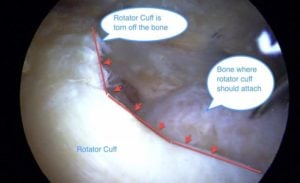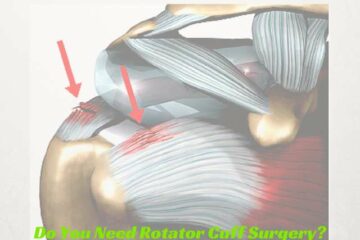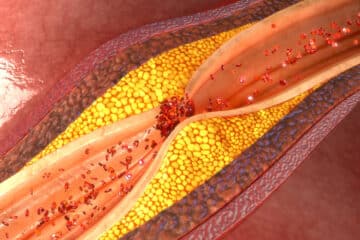
You are considering rotator cuff surgery. You are concerned about your rotator cuff healing and recovery. Many rotator cuff tears will heal after surgery. Some tears, however, may not heal. Rotator cuff healing is a very complex topic. Why? Because the rotator cuff is a very complex structure, and the shoulder is a tough environment for healing to occur. Healing of your rotator cuff tear will be dependent on many different variables. This post will cover healing of your rotator cuff tear. We will discuss the relevant information we use to determine if your tear has a good chance of healing after rotator cuff surgery.
Many of you will develop a rotator cuff tear due to severe tendinosis (degeneration) of your rotator cuff. That is simply because the rotator cuff tendon can wear out over time. Although far less common, some of you will tear your rotator cuff after a fall or injury.
Healing of your rotator cuff
Healing of your rotator cuff tear will depend on many issues, including:
- the cause of your rotator cuff tear (degeneration versus injury)
- the size of your tear and
- how long your tear has been present.
Many of you have already tried injections, anti-inflammatories , an ice compression wrap and physical therapy. For some of you that worked, for others a rotator cuff repair surgery becomes an option. Let’s review the current research about rotator cuff healing.
The rotator cuff are a group of four muscles that surround the shoulder. They come together in a “cuff” which surrounds the top of your humerus. The rotator cuff of a 50 year old does not look like the rotator cuff of a 20 something. Think of your favorite pair of blue jeans — the denim around the knee looks very different then it did when your purchased them 15 years ago. The rotator cuff can wear out too. If it wears out enough, a tear or defect can result.

- Do all rotator cuff tears require surgery? No.
- Can the rotator cuff tear become larger without surgery? Yes.
- Can the rotator cuff heal without surgery? No.
- Do all rotator cuff tears heal? Short answer, No.
There is also a lot of controversy about what we as surgeons should do both during and after surgery to try and give your rotator cuff tear a better chance at healing. Below are a set of observations recently published in one of our major journals. They are meant to show whether or not many of the tips/tricks we try at the time of your rotator cuff surgery will improve the chance of healing.
What might affect rotator cuff healing
➤ Several studies have noted that increasing age is a significant risk factor for diminished rotator cuff healing. This may be because our rotator cuff tissue is wearing out. Biomechanical studies have suggested the reason for this may be an inferior healing environment in older patients. Healing is complex. It takes many cells, and chemicals or proteins to help heal a tendon. As we age, the chance creating a healing environment in the shoulder diminishes.
➤ Larger tears and fatty infiltration or atrophy negatively affect rotator cuff healing. This post will explain why the size of the rotator cuff tear matters.
➤ Arthroscopic rotator cuff repair, removing bone spurs in the shoulder, and the use of platelet-rich plasma (PRP) do not demonstrate an improvement in structural healing over mini-open rotator cuff repairs, single-row repairs, not performing an acromioplasty( removing a bone spur), or not using PRP. (Despite evidence that bone spurs do not cause tears, or improve healing of tears if they are removed, many surgeons will recommend it)
➤ There is conflicting evidence to support postoperative rehabilitation protocols using early motion over immobilization following rotator cuff repair.
via The Journal of Bone & Joint Surgery | Factors Affecting Rotator Cuff Healing.
So… what does that mean to you ?
Rotator Cuff Healing Take Home Messages
– IF you are over 60, your rotator cuff tissue is wearing out. While we have very strong sutures and very strong ways to attach your rotator cuff to the bone… that does NOT address the underlying reason why your rotator cuff might not heal. Your rotator cuff repair might fail because your tissue is simply too worn out. Again.. imagine closing a big hole in the front of your jeans. The strength of the thread doesn’t matter , because the fabric is soft, and falling apart. Only recently have shoulder surgeons started to use a biological patch to try an reverse the degenerative changes in the tissue. If all goes well, this patch could theoretically decrease the risk of re-tearing your rotator cuff. Ask your surgeon if they plan on using this. Many orthopedic companies are now starting to offer various type of patches. These patches might increase the chance that a rotator cuff will heal. Time will tell as the research into this are continues.
We in the in Orthopedic community need to change our focus to the “biology” of healing. For far too long we focused on using stronger sutures, or stronger bone anchors. Instead, we now need to focus on technologies that could reverse the tendinosis or degeneration and improve the healing environment within your shoulder.
– A bone spur in your shoulder is NOT the reason why you should consider surgery. There have been so many research studies showing that removal of the bone spur does not improve shoulder pain or decrease the risk of developing a new rotator cuff tear.
– Large tears do not heal as well as smaller tears. Some small tears will become larger with time. Sometimes it’s best to consider surgery sooner rather than later to improve your chance that the rotator cuff will heal.
Perhaps THE MOST important paper to come out in the realm of rotator cuff repairs showed that your risk of your rotator cuff tear not healing or tearing again extends beyond 6 months after surgery. These researchers showed that if your therapy is too aggressive or if you return to your normal activities too fast your rotator cuff repair might fail. That would be a shame to put in all that effort and endure all the pain only to have your rotator cuff repair fail. If your PT or surgeon says you can return to normal activities before 6 months they’re simply wrong. Protect that shoulder of yours, your first repair is your best chance at a successful rotator cuff repair.
I hope this little lesson in rotator cuff healing was helpful. If you still have other questions about rotator cuff tears there are many, many more posts on this site to guide you.
Click HERE to learn 5 more key facts about rotator cuff tears.
Further updated thoughts on why a rotator cuff tear might not heal can be found here.
There are Amazon affiliate links on this page.












Thank you. My surgeon first said at least 6 weeks, so I put the surgery off. I saw him this week to schedule surgery and he said 2-3 weeks.
I also have several cysts from chronic inflammation. I injured my arm about 15 years ago and have dealt with the pain long enough.
It just seems like I have a lot of issues with my shoulder, so recovery may take longer.
I am a 54 year old very active female (yoga/mountain biker) I have a 60% tear of the supraspinatus muscle. My doc is recommending 6 weeks of PT….my question is….what is the likelihood of this healing WITHOUT surgery? I have been using a tens unit and anti-inflamatories on my own for the past month.
The pain has a good chance of subsiding… the tear has little chance of healing. If PT doesn’t help then you may want to explore other options.
Does a rotator cuff tear cause upper arm muscle spams?
sometimes it can
H dr.luks
I am 80 years old I went to see an orthopedic dr. For my shoulder stiffness he check my shoulder and he suspect a tears in the rotator cuff and ask me if I have a continuos pain. I don’t have a continuous pain
I have pain only if I left my arm over my had and some other movement. He did not recommend surgery
He said he I’ll consider surgery If I have continuous pain. And he recommend therapy consider my age
He did not consider MRI at ths moment. Is he correct
He does sound like he’s correct.
I am 59 years old I tore my rotator cuff last May 11,2015 at firs the pain was extremely bad but starting this month I feel better but still it still hurt if I reach my back, when I’m lying down and push myself to position.impression after MRI.
1.AC joint degenerative and type 3 carom ion resulting in impingement. 2.Distal rotator cuff tendinoses with small intrasubtance tear of supraspinatus tendon and questionable insertion tear. 3.interval edema suggestive of tear. 4.Abnormal superior labrum signal suspicious of tear. 5 .subacromial and subdetoid bursitis. I am still active and work fulltime,constantly pick up 6lbs that will total to 800lbs during my work. will really appreciate for the best option of treatment that you will advice.Thank you so much.
You have non-surgical options too with a reading like that… consider a second opinion and understand that degenerative tendinosis will worsen over time — no matter what you do.